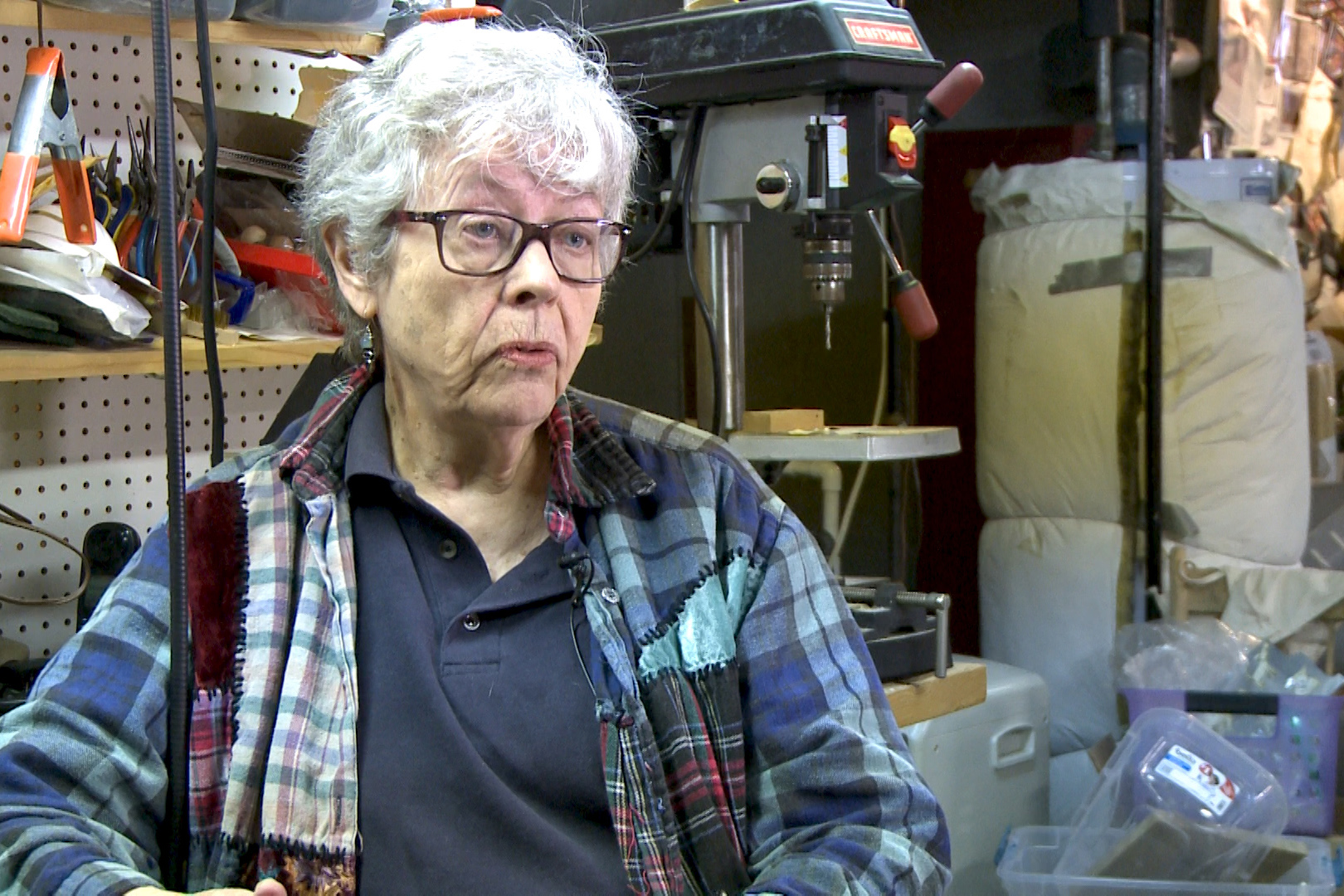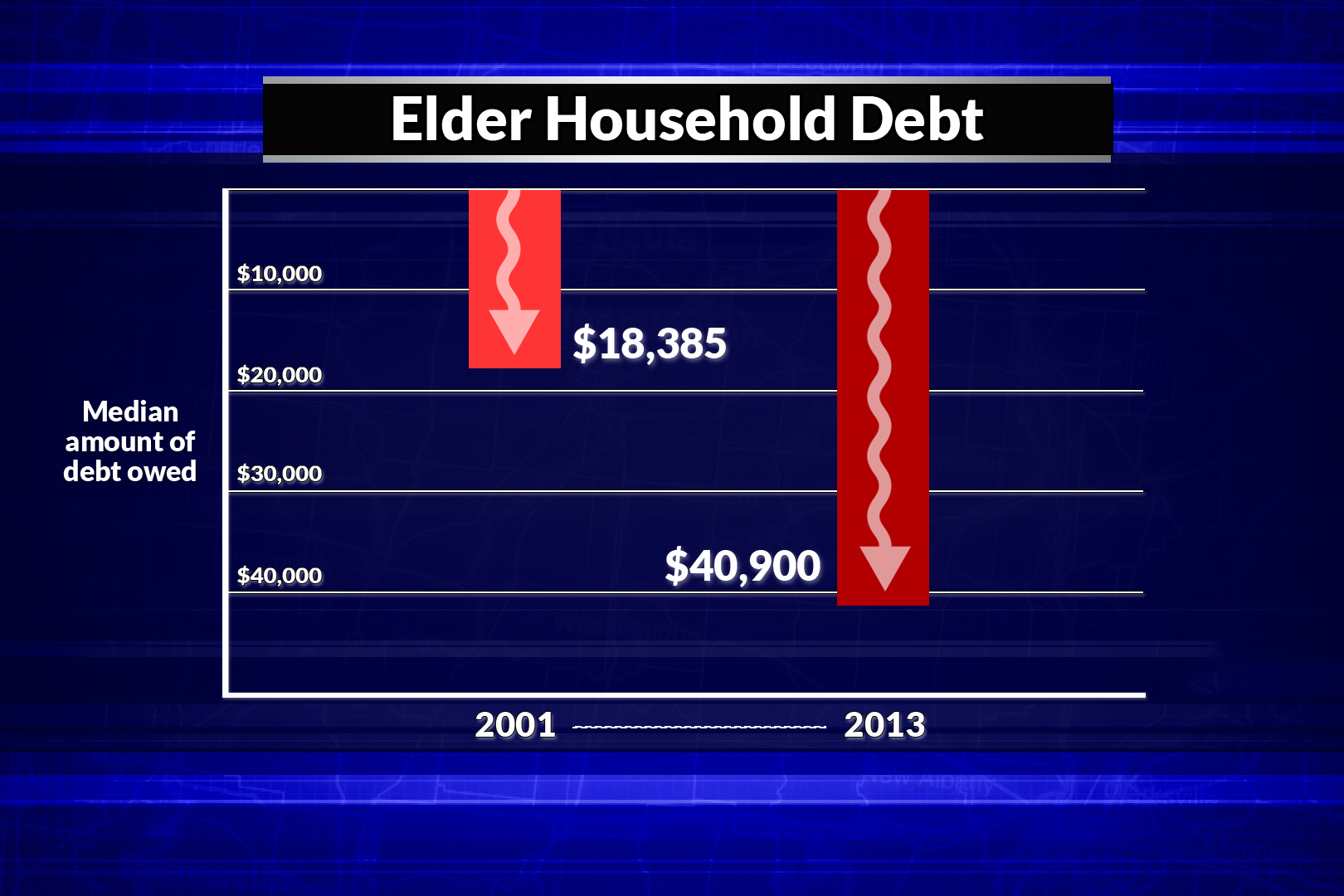
Beth Wentz in her basement art studio (Lindsey Wright, WTIU/WFIU News)
Beth Wentz collects everything she can for her multimedia artworks.
It's a lot of stuff and it can be a little overwhelming, but she has a system to make sense of it. That wasn’t the case when it came to the large amounts of credit card debt she carried several years ago. Wentz didn’t know how to sort through that mess.
“It did weigh heavily on my shoulders because there was no one I could share that with,” she says.” I didn’t want to say, oh woe is me, because I caused this, but yet it wore on my conscience constantly.”
Wentz says the debt became too much after she lost her job of 28 years. She paid what she could, but she knew she something had to give. Like many elderly Americans, Wentz turned to bankruptcy. She saw that her local library was offering free legal help to those who qualified. She worked with the Senior Law Project, which is part of Indiana Legal Services.
A recent study by the Consumer Bankruptcy Project found a drastic jump in the number of older adults filing bankruptcy.
Most individuals who file in the country file for chapter 7 bankruptcy, often referred to a as a “fresh start” bankruptcy. A lot of chapter 7 cases end in discharge, erasing unsecured debts such as credit card and medical debt.

But, even though your debt is gone, the bankruptcy will stay on your credit report for a decade. Wentz knew that when she filed but, a fresh start is exactly what she needed.
“The bottom line is I knew I couldn’t meet the payments I had acquired or accumulated over the years,” Wentz says. “And looking at my age and job wise, this was the only option.” And she isn’t alone in feeling that way.
Pamela Foohey is one of the co-authors of the Consumer Bankruptcy Project Report. She says everything from credit card debt, to mounting medical bills causes many elderly people to file for bankruptcy.
“Between the 90’s and now the percentage of older Americans in bankruptcy has increased more than twofold,” Foohey says. As a percentage of the people who actually file bankruptcy is increased 500 percent.”
And she says there’s a reason that vulnerable segment of the population is having an especially hard time financially.
"Our social safety net has been tightened in recent year," Foohey says. "For example, that benefits start later, at the same time retirement plans moved from benefit designated plans to contribution designated plans."
That shifts the risk of market collapsed onto older Americans. Seniors whose retirement funds took big hits as a result of market losses in 2008 were not in a position to work to put more money back into those funds.
So the economy’s rebound didn’t do much to help them, either.
According to the report from the Consumer Bankruptcy Project, median debt in households with older adults more than doubled from 2001 to 2013.

Foohey says for elderly folks, who don’t have the potential to go out and work to generate more income, that debt can be daunting.
And that’s before the calls from collections agencies start. Wentz got one at an art gallery she was working at part time.
“I don’t know how this guy got the phone number to where I work, and he was calling and kind of harassing, which I thought they couldn’t do,” Wentz says.
Foohey says the incessant phone calls are a common tactic for collections agents. And under that pressure, people can make life altering mistakes.
“What they do and what our data seems to show is they cash out retirement accounts they use that money to pay off the medical bills and they are left with nothing and they can’t keep up with everyday expenses,” Foohey says.
That is a state of affairs Wentz understands all too well. When she lost her job, she lost her retirement account.
So, she’s doing what she can to make ends meet. Foohey says retirement funds are vital for seniors. So she has some advice for those who find themselves in a situation similar to Wentz’s.
“It’s not your fault, this is the situation you are in. File bankruptcy,” She says. “Do not cash out your retirement account.”
And while things are bad for seniors, they could be worse for millennials. Foohey says older Americans and the younger generation are in similar circumstances, just swapping out housing debt for student debt.
As for Wentz, she says there is plenty of life after bankruptcy, no matter how old you are. She’s determined to keep making her art and move on.
"I am going to be able to clean my studio, get it together, make art and sell it," Wentz says. "So hopefully that’s down the line. I am aiming for that."







